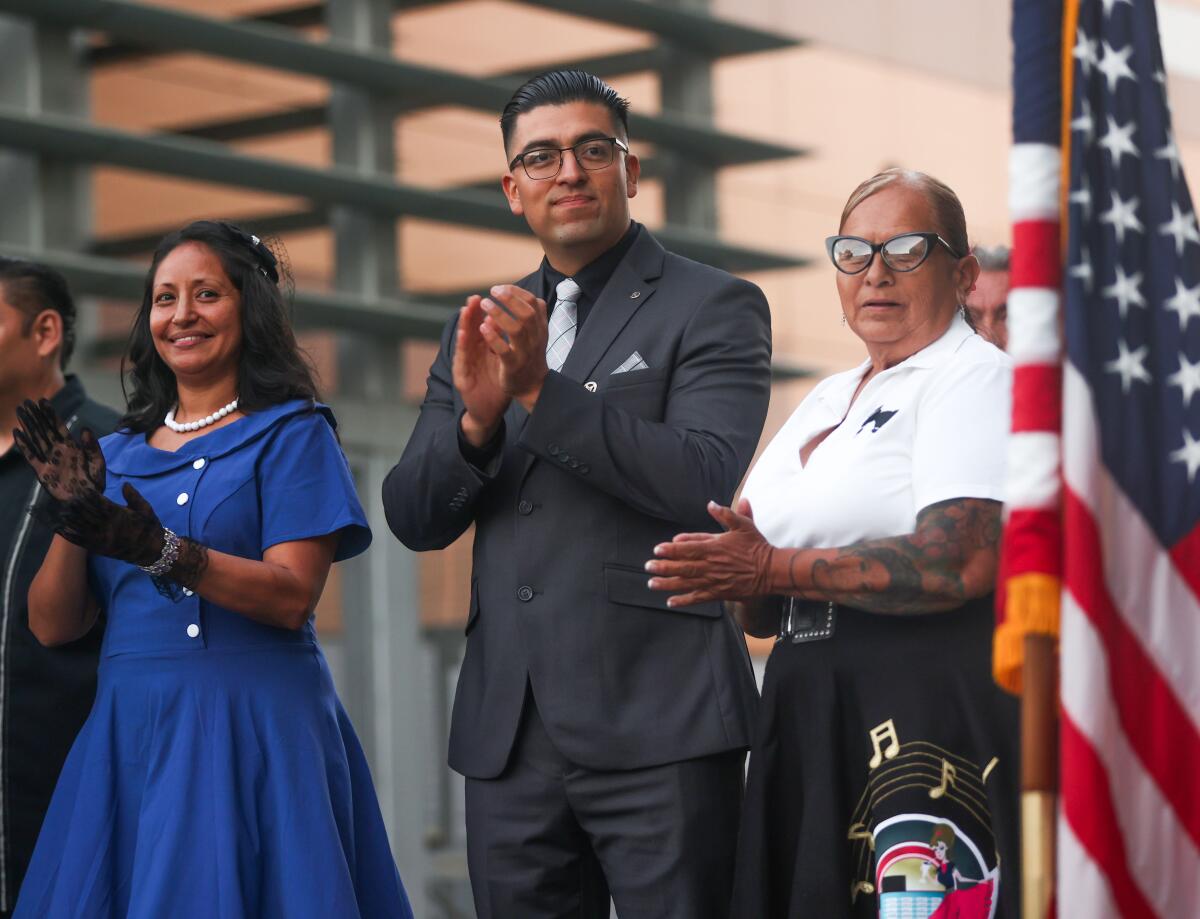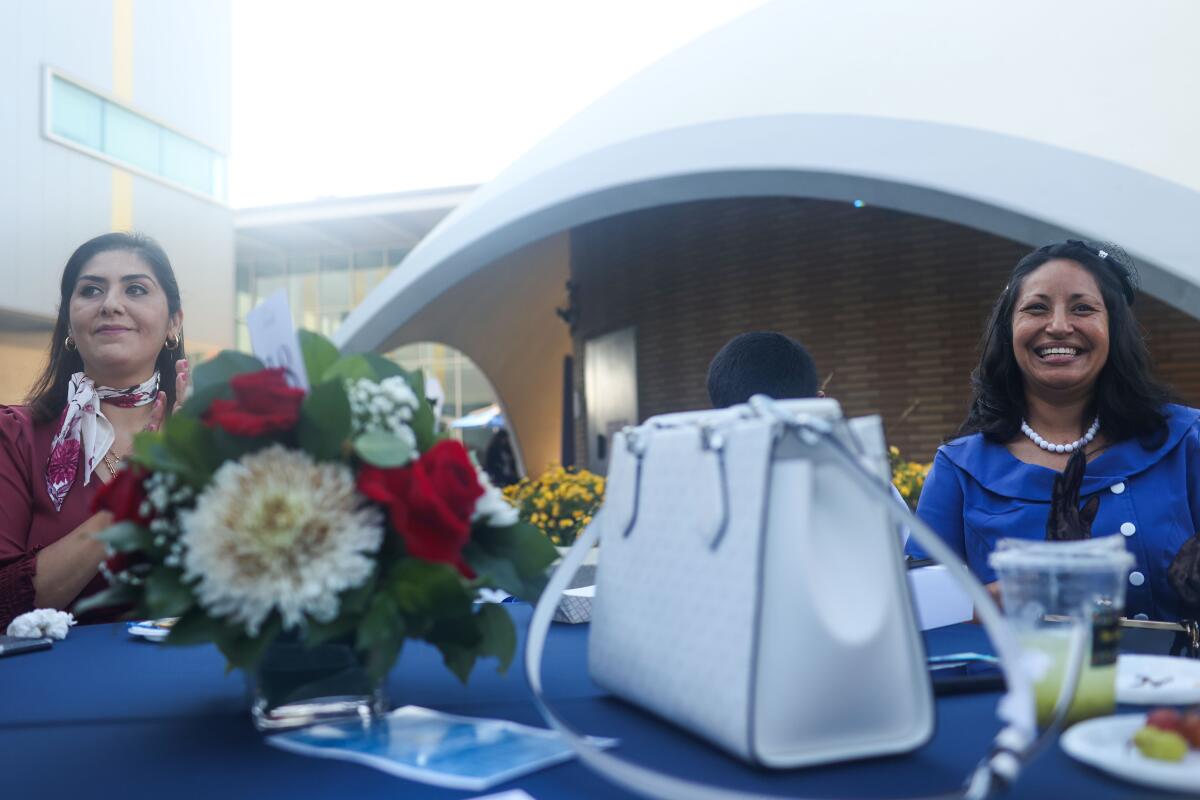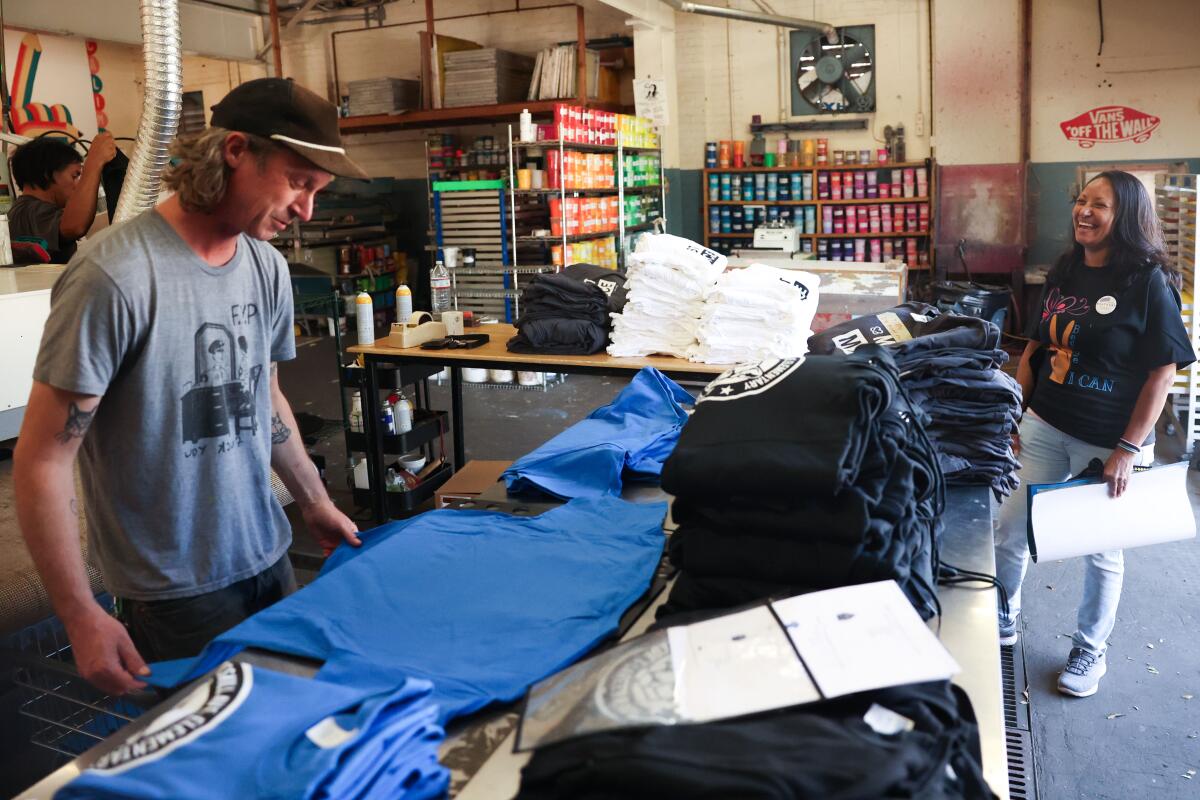In Wilmington, a political contest where rivals actually get along

- Share via
The political opponents looked at each other from their campaign tables outside the Wilmington Recreation Center.
Alejandra Rodriguez’s display featured pamphlets about who she was and a framed poster of her in front of the Banning Museum. Her boisterous mom told anyone within earshot why Rodriguez should be the next honorary mayor of Wilmington.
Alicia Baltazar and her son laid out free chips, homemade mini-muffins and her own campaign poster: a portrait in front of the shipping cranes that serve as the southern skyline for the port community. But she had a problem: The poster kept tumbling off a flimsy cardboard stand.
Rodriguez walked over and set up a small metal A-frame.
“Thank you!” a grateful Baltazar said.
“Thank you!” Rodriguez, 38, exclaimed with a genuine smile.
“See what I mean?” the 46-year-old Baltazar told me. “We’re running together, against each other!”

The encounter was par for the proverbial course in one of the most wholesome political races in Southern California.
For the last 70 years, Wilmington residents have faced off to become the blue-collar community’s honorary mayor. The winner gets a two-year term that offers no salary, no staff and no political power. No votes are cast; no political action committees are created.
The position is a relic from a time when dozens of communities across Los Angeles appointed titular figureheads for promotional purposes — usually film and television stars like Steve Allen (Encino), Roy Rogers (Studio City) and Johnny Grant (Hollywood), who lived or worked in the area and whose duties mostly included posing for photos during parades and grand openings.
Like Wilmington, which was once its own city before becoming part of Los Angeles in 1909, these communities weren’t incorporated, so they didn’t have traditional mayors or city councils.
Tradition: The city, where at least 20 hold the title of honorary mayor, is typical of the Southland, where the concept thrives.
At one point, honorary mayors formed an organization to “find how to serve a more useful and functional purpose to our communities and the city of Los Angeles,” according to a 1965 Times article.
At least 20 communities still picked an honorary mayor as recently as 2001, according to a Times article from that year. Nowadays, a handful remain, including Wilmington, San Pedro, Pacific Palisades and Woodland Hills, where former L.A. Councilmember Dennis Zine holds the title.
“Part of it has always been gimmicky — the sunshine state and sunshine city,” said Jaime Regalado, a professor emeritus of political science at Cal State L.A., who dates the tradition to the 1920s and the rise of Hollywood. “But I don’t think they matter anymore. Towns have grown over time, and they’ve discovered the role doesn’t bring the prestige it brings.”
Wilmington has always distinguished itself by making its honorary mayors work for the, well, honor.
Candidates attend community events, hold fundraisers, stand on street corners, knock on doors, and ask wealthy individuals and companies to cough up a bit more than a buck — just like an actual political campaign. The winner is the one who raises the most money for a local nonprofit of their choice, mostly by selling $1 tickets.
“We’re real old school,” Wilmington Chamber of Commerce Chief Executive Monica Diaz replied when I asked why the town still does it the way it does. “It’s a friendly competition, but we’re talking about people who are very passionately representing their organizations. It’s a way to create local leadership, above all.”
This year’s honorary mayor will be announced at a Wilmington Chamber of Commerce event on Sept. 26. In 2018, the last time the race happened, the candidates collectively raised $41,200.
When I pressed Diaz about any perks for the winner this time around, she mentioned riding in a convertible as grand marshal of a parade and free admission to Chamber of Commerce events. “We could do a sash, I guess!” she added.
I saw Baltazar and Rodriguez in action last month at a Summer Night Lights event, held by the L.A. mayor’s Office of Gang Reduction and Youth Development in parks throughout the city.
Baltazar, a self-described “Army brat,” sees running for honorary mayor as a way to give back to the community where she has lived the longest — nine years. She’s raising funds for Tianguiz Cultural, which holds night markets in Wilmington and San Pedro.
“I love that my son can’t ditch school without someone calling me. If I get a flat tire, someone will help,” said Baltazar, a community activist and parent leader who sits on an advisory committee for Los Angeles Unified board member Tanya Ortiz Franklin. “I want to build a village for my son, and Wilmington offers that.”
She stayed quiet. “I almost want to lose so I can run again and raise even more funds.”
Rodriguez is campaigning for the Wilmington Teen Center, which she frequented growing up, since it was across the street from her family’s apartment.
She wanted to run in 2018. But, she said, “I didn’t think I had a chance to win. This time around, I realized it’s not about who wins, because at the end of the day, everyone wins.”

She technically wasn’t campaigning at Summer Night Lights, because she was on the clock as a district representative for Los Angeles City Councilmember Tim McOsker, who represents Wilmington.
But her boss allowed her to check in with her mom from time to time to see how the ticket sales were going.
“No, I’m not endorsing anyone!” McOsker said with a laugh, although he did donate $1,000 from his officeholder committee account to each of the four candidates: Rodriguez, Baltazar, Erick R. Ojeda Garcia and Cindy Guerrero.
“It’s the least efficient way in the world to raise funds — a ticket for a dollar!” McCosker added. “You’re just giving yourself for free.”
The council member is from San Pedro, which has a similar honorary mayor’s race.
“It’s so crucial to create community,” he said. “It’s a lesson for us [politicians]: Be close to the people you want to serve.”
They’re an elite group, the honorary mayors past and present on the Westside.
No one at Summer Night Lights paid attention to Baltazar or Rodriguez at first. Kids ran in the grass or drew at the arts table. Moms chatted at picnic tables. People walked their dogs. Men played basketball inside the gym; families lined up next to a big grill to grab free nachos and burgers.
One man holding a plate with two cheeseburgers finally went up to Rodriguez’s table, only to tell her mom, Graciela Sepulveda, that he didn’t care about politics.
“Well, you can still give a dollar,” Sepulveda shot back in Spanish. “If you don’t help, things like this won’t continue.”
The man, who declined to give his name, stomped off, saying he didn’t believe in anything. Sepulveda shrugged. “He’s missing out!”
Soon after, a woman approached Baltazar, then quickly walked away.
“That’s my big downfall — I don’t speak Spanish,” a dejected Baltazar said when I asked what happened.
But ticket sales began to pick up once the sun set and adults realized what the honorary mayor race was actually about.
Rita Anaya bought two from Baltazar. “It’s a really nice thing to do,” the Wilmington resident said in Spanish. “I really like her display.”
Next up was Alejandra Cervantes, who had never heard of the race even though she has lived in Wilmington for more than 20 years.
“That’s a great idea,” she said in Spanish. “Politics is always about tearing people down, and power, and people get tired of that. But politics where all you do is help? I can support that.”
Cervantes then went over and purchased two tickets from Sepulveda, who was doing a great job for her daughter.
But free, delicious muffins will beat pamphlets any day. As I got ready to leave, Rodriguez had sold 25 tickets to Baltazar’s 56.
The gap didn’t damp Rodriguez’s spirit. At one point, Milvia Coloma went up to Baltazar and spoke in Spanish. The candidate silently motioned to Rodriguez for help.
Once again, Rodriguez was happy to oblige. She explained how the honorary mayor race works to Coloma, who didn’t understand why rivals would help each other. Weren’t the two of them seeking the same thing?
“It’s good to cooperate for good things,” Rodriguez said. That drew a nod from Coloma.
“OK, give me five,” she said to Baltazar. And then she walked over to Rodriguez’s booth and bought five more.
More to Read
Sign up for Essential California
The most important California stories and recommendations in your inbox every morning.
You may occasionally receive promotional content from the Los Angeles Times.











